Timelines, Graphs, Charts
Time Lines, Graphs, Charts, and Diagrams are graphics that provide information to the reader and are used to add to the words used in documents so the reader can understand the information. Read More...
◂Social Studies Worksheets and Study Guides Fifth Grade. Timelines, Graphs, Charts
Study Guide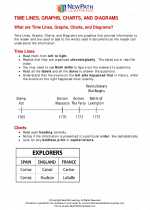 Timelines, Graphs, Charts
Timelines, Graphs, Charts  Worksheet/Answer key
Worksheet/Answer key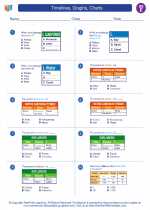 Timelines, Graphs, Charts
Timelines, Graphs, Charts  Worksheet/Answer key
Worksheet/Answer key Timelines, Graphs, Charts
Timelines, Graphs, Charts  Worksheet/Answer key
Worksheet/Answer key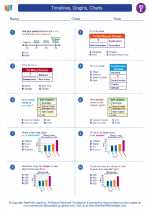 Timelines, Graphs, Charts
Timelines, Graphs, Charts  Worksheet/Answer key
Worksheet/Answer key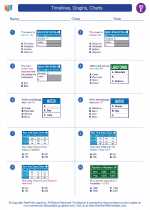 Timelines, Graphs, Charts
Timelines, Graphs, Charts  Worksheet/Answer key
Worksheet/Answer key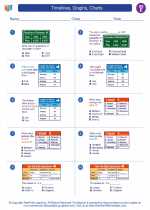 Timelines, Graphs, Charts
Timelines, Graphs, Charts  Worksheet/Answer key
Worksheet/Answer key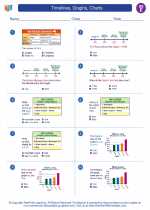 Timelines, Graphs, Charts
Timelines, Graphs, Charts 

 Worksheet/Answer key
Worksheet/Answer key
 Worksheet/Answer key
Worksheet/Answer key
 Worksheet/Answer key
Worksheet/Answer key
 Worksheet/Answer key
Worksheet/Answer key
 Worksheet/Answer key
Worksheet/Answer key
 Worksheet/Answer key
Worksheet/Answer key

The resources above cover the following skills:
National Curriculum Standards for Social Studies (NCSS)
TIME, CONTINUITY, AND CHANGE
SOCIAL STUDIES PROGRAMS SHOULD INCLUDE EXPERIENCES THAT PROVIDE FOR THE STUDY OF THE PAST AND ITS LEGACY.
KNOWLEDGE - Learners will understand:
The study of the past provides a representation of the history of communities, nations, and the world.
Concepts such as: chronology, causality, change, conflict, complexity, multiple perspectives, primary and secondary sources, and cause and effect.
That learning about the past requires the interpretation of sources, and that using varied sources provides the potential for a more balanced interpretive record of the past.
That historical interpretations of the same event may differ on the basis of such factors as conflicting evidence from varied sources, national or cultural perspectives, and the point of view of the researcher.
Key historical periods and patterns of change within and across cultures (e.g., the rise and fall of ancient civilizations, the development of technology, the rise of modern nation-states, and the establishment and breakdown of colonial systems).
The contributions of key persons, groups, and events from the past and their influence on the present.
The influences of social, geographic, economic, and cultural factors an the history of local areas, states, nations, and the world.
PROCESSES - Learners will be able to:
Identify and use a variety of primary and secondary sources for reconstructing the past, such as documents, letters, diaries, maps, textbooks, photos, and other sources.
Research and analyze past periods, events, and issues, using a variety of primary sources (e.g., documents, letters, artifacts, and testimony) as well as secondary sources; validate and weigh evidence for claims, and evaluate the usefulness and degree of reliability of sources to develop a supportable interpretation.
PRODUCTS - Learners demonstrate understanding by:
Developing an illustrated timeline of a sequence of events representing an important historic era.
PEOPLE, PLACES, AND ENVIRONMENTS
SOCIAL STUDIES PROGRAMS SHOULD INCLUDE EXPERIENCES THAT PROVIDE FOR THE STUDY OF PEOPLE, PLACES, AND ENVIRONMENTS.
KNOWLEDGE - Learners will understand:
The concept of regions identifies links between people in different locations according to specific criteria (e.g., physical, economic, social, cultural, or religious).
The use of a variety of maps, globes, graphic representations, and geospatial technologies to help investigate the relationships among people, places, and environments.
PROCESSES - Learners will be able to:
Research, organize, analyze, synthesize, and evaluate information from atlases, data bases, grid systems, charts, graphs, maps, geospatial technologies, and other tools to interpret relationships among geographic factors and historic events.
National Center for History in Schools (NCHS)
Historical Thinking Standards
Chronological Thinking
Identify the temporal structure of a historical narrative or story.
Interpret data presented in time lines and create time lines.
Reconstruct patterns of historical succession and duration; explain historical continuity and change.
Compare alternative models for periodization.
Historical Comprehension
Reconstruct the literal meaning of a historical passage.
Identify the central question(s) the historical narrative addresses.
Historical Analysis and Interpretation
Draw comparisons across eras and regions in order to define enduring issues.
Challenge arguments of historical inevitability.
Hold interpretations of history as tentative.
Historical Research Capabilities
Formulate historical questions.
Employ quantitative analysis.
Historical Issues-Analysis and Decision-Making
Identify issues and problems in the past.
Identify relevant historical antecedents.
United States History Content Standards
Era 1: Three Worlds Meet (Beginnings to 1620)
Comparative characteristics of societies in the Americas, Western Europe, and Western Africa that increasingly interacted after 1450.
The student understands the differences and similarities among Africans, Europeans, and Native Americans who converged in the western hemisphere after 1492.
How early European exploration and colonization resulted in cultural and ecological interactions among previously unconnected peoples.
The student understands the stages of European oceanic and overland exploration, amid international rivalries, from the 9th to 17th centuries.
World History Content Standards
Era 6: The Emergence of the First Global Age, 1450-1770
Economic, political, and cultural interrelations among peoples of Africa, Europe, and the Americas, 1500-1750.
The student understands how states and peoples of European descent became dominant in the Americas between the 16th and 18th centuries.